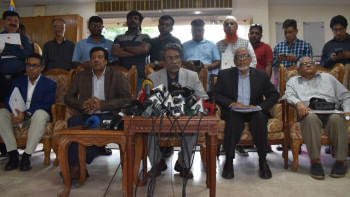At 50, Bangladesh lifts millions from proverty

Bangladesh is enjoying rapid economic development and improved living standards for its people.
Bangladesh has lifted more than 25 million people out of poverty in the last 15 years and cut poverty in half since 2000. "Bangladesh has made remarkable progress in reducing poverty, supported by sustained economic growth," the World Bank noted in November 2018.
The United States has long supported Bangladesh's development, aiding its rise from one of the world's least developed countries to one now eyeing upper-middle-income-country status by 2031.
Since 1971, the United States has provided Bangladesh more than $8 billion in foreign assistance. The support has trained farmers and fisherman, brought electricity to rural communities and improved access to health care, education and other services.
The U.S. Agency for International Development's (USAID) Feed the Future program has helped reduce poverty an estimated 37% in the areas where it has operated since 2011. In 2015, the program trained 2 million Bangladeshi farmers in agricultural techniques, leading to a 20% increase in revenues.
USAID training helped farmer Taroni Kanto Shikari double his production of rice, a staple of the Bangadeshi diet. With the increased revenue, he sent his daughter to college. "When I was young I didn't have the opportunity to study. But now my children have the choice," Taroni said. "They can go into any profession they desire."
USAID's Food for Peace program seeks to address the root causes of poverty through work in multiple sectors, including agriculture and health care. The program has reached 3.5 million Bangladeshis since 2010, improving incomes by 90% in targeted areas.
Monjuara Begum, of Sirajganj, says she increased her vegetable harvests with techniques learned in the program. She's invested her increased revenues in livestock.
"My ducks and chickens lay eggs, some of which I sell," Monjuara said. "I also feed the eggs to my children, and I eat some myself."
USAID has also partnered with the government of Bangladesh and WorldFish to significantly increase harvests of hilsa, the country's national fish, through sustainable practices.
The United States continues to support Bangladesh, aiding the country's fight against the COVID-19 pandemic and bolstering its economic recovery. The US donated 72 million doses of COVID-19 vaccines to Bangladesh.
In June 2020, the United States announced $173 million to complement Bangladesh's fight against COVID-19 and support post-pandemic economic recovery and development, adding to the nearly $37 million the United States already contributed to the country's COVID-19 response.
In 2019, USAID provided more than $200 million in aid to improve health and education and to bolster economic opportunity and food security in Bangladesh.
"I'm proud that USAID has been a long-standing partner of Bangladesh and is committed to helping achieve Bangladesh's goal of becoming an upper-middle-income country by 2031," USAID Mission Director Derrick Brown said in June 2020.

 For all latest news, follow The Daily Star's Google News channel.
For all latest news, follow The Daily Star's Google News channel. 



Comments